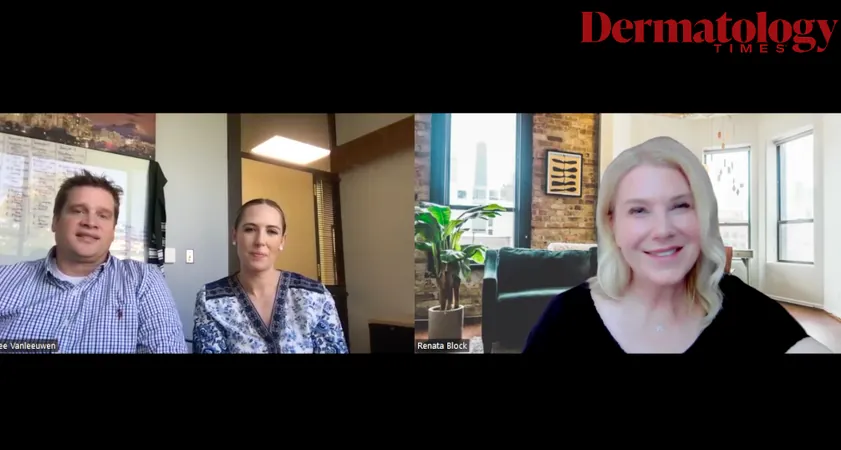
Revolutionizing Skin Cancer Detection: The SCAN Project Empowers Cosmetologists
2024-11-06
Author: Mei
Introduction
In a groundbreaking initiative, the SCAN Project is equipping cosmetologists and hairdressers with the tools necessary to identify early signs of skin cancer. “Cosmetologists and hairdressers have a unique advantage; they see areas on the scalp and face that are often overlooked,” explains Bree Vanleeuwen, PA-C. Unfortunately, many of these professionals lack adequate training in recognizing skin cancer symptoms, prompting the creation of the SCAN program.
SCAN Project Overview
Recently, Vanleeuwen and her colleague, Jim Sutton from Utah Valley University, spoke about the SCAN initiative in an enlightening interview. Funded by the SCAN Grant, this innovative program has swiftly expanded from its roots in Utah, aiming to launch chapters across the United States. They are set to present their findings at the Society of Dermatology Physician Assistants (SDPA) conference in Las Vegas, showcasing how the program empowers community professionals to improve early detection and ultimately enhance patient outcomes.
Training and Empowerment
The SCAN Project’s mission focuses on training cosmetologists, estheticians, and hairdressers to identify suspicious skin lesions during their regular client interactions. This proactive educational approach targets individuals who frequently encounter skin up close but often lack formal training in skin cancer recognition. By capitalizing on the routine visits of clients, SCAN aims to catch potential skin cancers before they escalate, especially in populations who may not visit dermatologists regularly.
Statewide Initiative
What began as a localized effort among hairdressers in Utah has blossomed into a statewide initiative with over 1,200 certified professionals across various states. Vanleeuwen and Sutton expressed their ambition to collaborate with other universities to further establish SCAN chapters nationwide, providing essential training in cosmetology schools. This strategy ensures that new professionals enter the field equipped with crucial knowledge about skin cancer identification from the very beginning of their careers. By securing partnerships with educational institutions, SCAN can reach larger groups and foster ongoing relationships to educate new cohorts over time.
Future Directions
During their upcoming presentation at the SDPA Fall conference, Vanleeuwen and Sutton will delve into the program’s successes and discuss future directions, including the need for more structured data collection regarding their training efforts. They have already compiled encouraging anecdotal evidence where trained cosmetologists successfully detected skin cancers and potentially saved lives. However, formal follow-up data is critical to substantiate SCAN's effectiveness and may be pivotal in securing additional funding for expansion.
Personal Commitment and Community Impact
The motivation behind SCAN runs deep for both Vanleeuwen and Sutton. Vanleeuwen's commitment to preventive care aligns with her background in dermatology and a personal dedication to promote sunscreen use. Meanwhile, Sutton pointed out the alarming melanoma rates in Utah, which are exacerbated by the state’s high altitude and outdoor lifestyle. Together, they are merging their expertise in clinical practice and education to drive meaningful improvements in community health.
Overcoming Challenges
Despite facing challenges early in establishing connections with cosmetology institutions, the team’s persistence paid off. Once they demonstrated the tangible benefits of SCAN to students and schools, engagement grew significantly. They credit a strong support system from Utah Valley University, including student interns who assist with training and outreach efforts. Their experience serves as an inspiration for other healthcare professionals, encouraging them to initiate similar community outreach projects by emphasizing a genuine commitment to addressing local healthcare needs.
Conclusion
Through the SCAN Project, Vanleeuwen and Sutton are pioneering a transformative approach to skin cancer detection within communities. Their invaluable work showcases the vital role that non-dermatology professionals can play in early identification, empowering them to contribute significantly to the fight against skin cancer on a national scale. As the fight against this widespread disease continues, initiatives like SCAN pave the way for innovative solutions that could lead to a significant reduction in skin cancer rates.



 Brasil (PT)
Brasil (PT)
 Canada (EN)
Canada (EN)
 Chile (ES)
Chile (ES)
 España (ES)
España (ES)
 France (FR)
France (FR)
 Hong Kong (EN)
Hong Kong (EN)
 Italia (IT)
Italia (IT)
 日本 (JA)
日本 (JA)
 Magyarország (HU)
Magyarország (HU)
 Norge (NO)
Norge (NO)
 Polska (PL)
Polska (PL)
 Schweiz (DE)
Schweiz (DE)
 Singapore (EN)
Singapore (EN)
 Sverige (SV)
Sverige (SV)
 Suomi (FI)
Suomi (FI)
 Türkiye (TR)
Türkiye (TR)